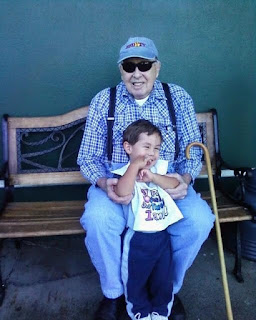
Apparently I haven't posted since Dad's traumatic header down a flight of stairs on August 8th. He and my daughter were attending a birthday party for a long-time friend of Dad's. The party was held in their church basement. As Dad and Deb were leaving, they climbed a flight of stairs and Deb told Dad to wait and she would grab their jackets. While he was waiting, he apparently became dizzy and took a dive down about eight steps, face forward and head down, coming to a stop on the landing.
To make a long story much shorter, he spent three days in ICU and ten days at a rehab center. He has had home health care since that time, mostly due to a large wound on his leg that is slow in healing. He is diabetic and healing this wound is a major consideration. Thankfully, the wound care people are taking good care of him.
David's Visit
The second major event this fall was the visit by my other daughter, Barb, and her son David. You will see his picture in the previous post. They stayed for approximately two weeks, and were missed before they even left the driveway. Texas is a long way from Michigan, and we have no idea when we will see them again. Thank God for cell phones with the ability to send pictures and short videos. We are able to keep up to date on David's growth and his activities.
Dad's 87th Birthday
The third event this fall was Dad's birthday on October 18th. He turned eight-seven-years-old (87). What a milestone. His sister turned 92 on the same dad. We didn't do anything really special, just had a quiet day of football and special dinner, but he did receive numerous birthday cards and phone calls throughout the weekend.
If you haven't had the chance as yet, stop over at the Elder Care Cafe.net and check out what is happening. We are up to 266 posts at this time and still going strong. Lot's of changes there recently in the look of the site, but the same intent - to support caregivers and the elderly - is still of utmost priority. We celebrated our 1st birthday in early August. We had a birthday cake, balloons, and of course Beyer's sugar free pecan ice cream.
Just a quick update. Hope you get a chance to visit us somewhere on the web. We are still here although we don't post as often anymore.
Let us know what is going on in your life. We would love to hear from you and how you are doing with your care giving. Take care and hope to hear from you soon.






